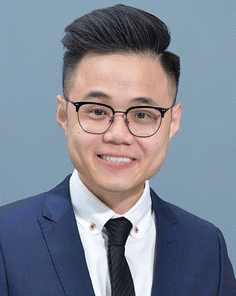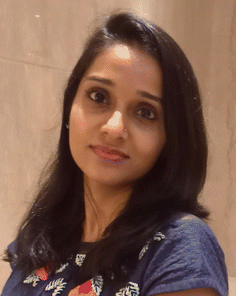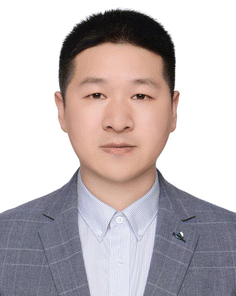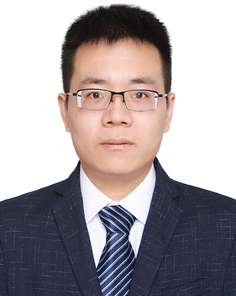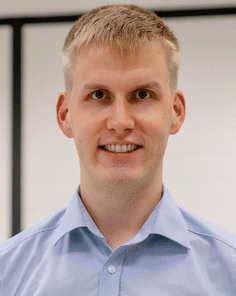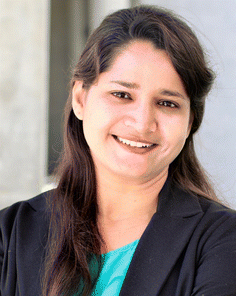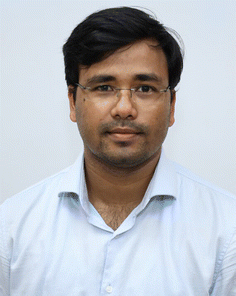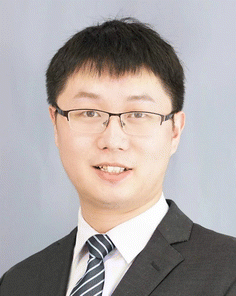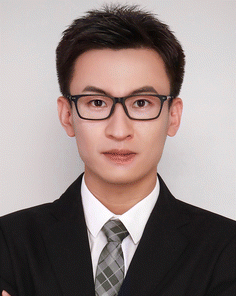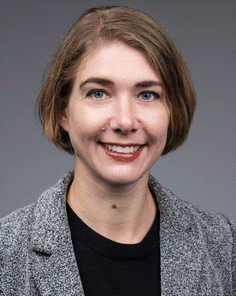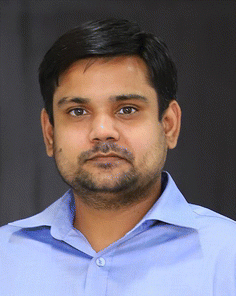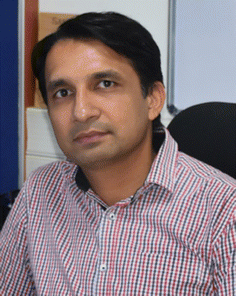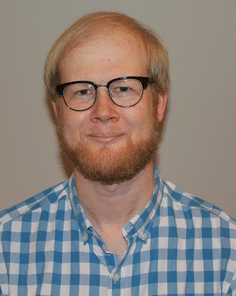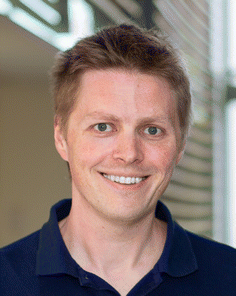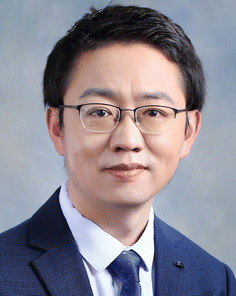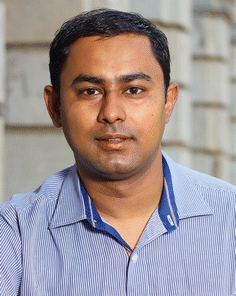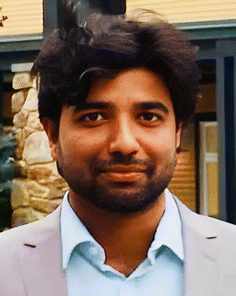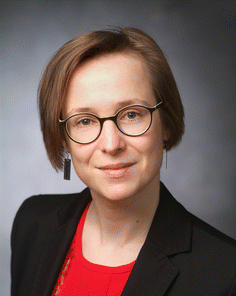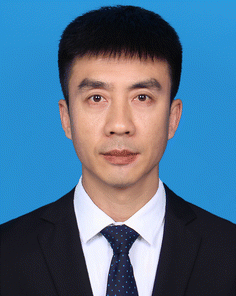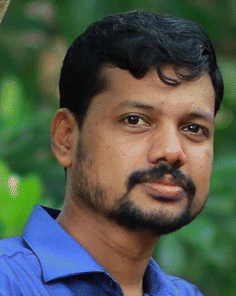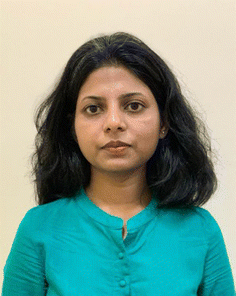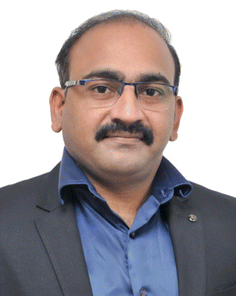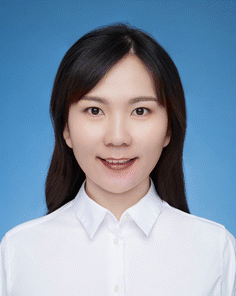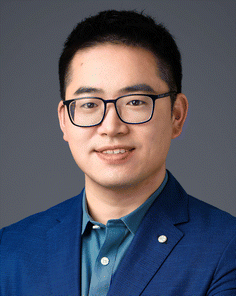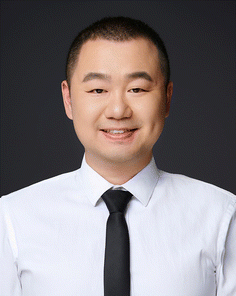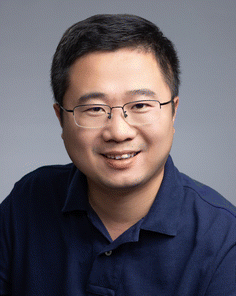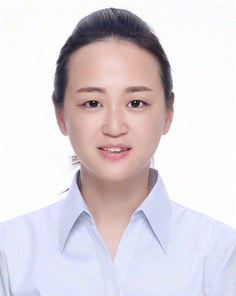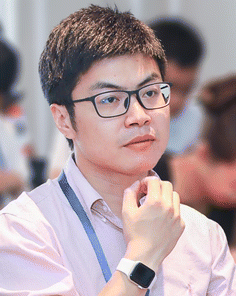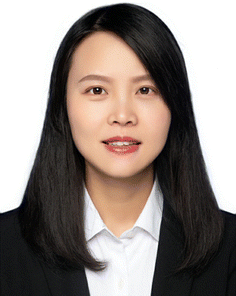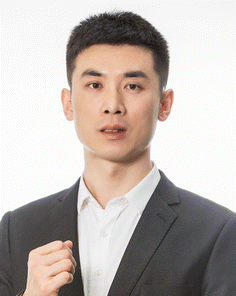DOI:
10.1039/D3CC90387G
(Profile)
Chem. Commun., 2023,
59, 14738-14744
Contributors to the Emerging Investigators collection 2023: Part 2
Edison Huixiang Ang is an assistant professor at the respected National Institute of Education/Nanyang Technological University in Singapore. He also holds positions on the Editorial Boards of journals like the Journal of Energy Chemistry, Chemical Engineering Journal, Scientific Reports, and Frontiers in Chemistry. His research is centered on merging nanotechnology and materials design to craft specialized nanostructures for advanced applications in energy storage, membrane technology, catalysis, and sensing. He has received prestigious awards, including the PIERS Young Scientists Award and the Sabic Young Professional Award, recognizing his dedication and contributions.
Harsha Bajaj received her PhD at Jacobs University Bremen, Germany, under the supervision of Prof. Mathias Winterhalter (2015) in Molecular Biophysics. She continued her post-doctoral studies in Germany and had several international collaborations, including with the University of Cambridge and Cagliari University
via the New Drugs for Bad Bugs project. She joined the CSIR-National Institute for Interdisciplinary Science and Technology (NIIST) Thiruvananthapuram (2018) as a DBT-Har Gobind Khorana IYB fellow to quantify membrane-interface processes including transport and membrane bending. In 2021, she attained a faculty position and started an independent group at the CSIR-NIIST focusing on membrane-mimicking systems and bottom-up biology for bio-medical applications.
Jiangzhao Chen is a professor at the College of Optoelectronic Engineering in Chongqing University. He received a PhD degree from Huazhong University of Science and Technology and worked as a postdoctoral researcher at Sungkyunkwan University and at the University of Hong Kong. His current research interests focus on perovskite solar cells.
Zhaowei Chen received his BE degree at Northwestern Polytechnical University in 2010, and his PhD in Chemistry at the Changchun Institute of Applied Chemistry, Chinese Academy of Sciences in 2016. Afterwards, he worked as a postdoctoral researcher sequentially in the Joint Department of Biomedical Engineering at the UNC and NCSU, Argonne National Laboratory, and University of California, Los Angeles. He joined Fuzhou University with a full-time position in 2020 and joined Zhejiang University with an adjunct position in 2021. His group focuses on the design and synthesis of bioinspired and biomimetic materials for building artificial cells, biomedical engineering, and biocatalysis.
André Eckhardt studied chemistry at the Justus Liebig University Gießen, where he obtained his Master's degree in 2016 and his PhD in 2019 under the supervision of Prof. Peter R. Schreiner. At the beginning of 2020, André joined the groups of Prof. Christopher C. Cummins at the Massachusetts Institute of Technology and Michael C. McCarthy at the Harvard–Smithsonian CfA as a Feodor Lynen postdoctoral research fellow. In 2022, André returned to Germany and became an independent research group leader with a Liebig Fellowship at the Ruhr University Bochum. His research group is interested in astrochemistry, matrix isolation spectroscopy, and reactive intermediates.
Ritika Gautam Singh obtained her MSc in Chemistry from IIT Delhi and moved to the United States to pursue her PhD in bioinorganic chemistry from the University of Arizona under the guidance of Prof. Elisa Tomat. During her PhD, she received David F. O’Brien and Galileo Circle Scholar Awards. Following that, she became a postdoctoral fellow with Prof. Kim D. Janda at the Scripps Research Institute, La Jolla, California. In Fall 2019, she moved back to India and started her independent research group at IIT Kanpur. Her research group focuses on engineering metal-based diagnostics and therapeutics at the interface of biological inorganic chemistry, synthetic immunotherapeutics, and medicinal chemistry. Off the clock, she's her 2.5-year-old toddler's tireless playmate.
Tufan Ghosh is currently an assistant professor at the VIT-AP University, India. He received a PhD in Chemistry from the Indian Institute of Technology Madras, India, with Prof. Edamana Prasad. After completing his PhD, he moved to the Hebrew University of Jerusalem, Israel, as a postdoctoral fellow with Prof. Sanford Ruhman, followed by a second postdoctoral position at Ruhr University Bochum, Germany, with Prof. Martina Havenith. His current research focuses on exploring charge-carrier dynamics in halide perovskites and semiconductor nanocrystals. He is the recipient of a Start-Up Research Grant from the DST-SERB, Govt. of India.
Zi-Hao Guo received his BSc degree in 2008 from Nankai University. In 2013, he earned his PhD in Organic Chemistry under the supervision of Prof. Jian Pei at Peking University. He worked as a Postdoctoral Researcher at Texas A&M University in 2014–2016 and Yale University in 2016–2018. From 2018, he started his independent career as an Assistant Professor at the School of Emergent Soft Matter, South China University of Technology (SCUT). Currently, his research interests are anode and solid-state electrolyte materials for lithium-ion batteries and conjugated semiconducting polymers for organic electronics.
Benhui Hu is a Professor at Nanjing Medical University, China. He received his BS degree in science from Nanjing University (China), MS degree in polymer physics and chemistry from the Chinese Academy of Sciences and PhD degree in materials science and engineering from Nanyang Technological University (Singapore). He has focused on biomechanical information perception and its related diagnosis and therapeutics. He also innovatively proposed an active-noise-reduction mechanism for decoding organ voiceprints.
C. Rose Kennedy is an assistant professor of chemistry at the University of Rochester. Rose earned her PhD from Harvard University (2017) working with Professor Eric Jacobsen on enantioselective, ion-binding organocatalysis. She subsequently conducted postdoctoral research with Professor Paul Chirik at Princeton University (2017–2019), where she developed iron-catalyzed methods for the elaboration of simple hydrocarbons. In 2020, Rose began her independent career at the University of Rochester, where her research group uses mechanistic analysis and bioinspired design principles to guide the development of catalytic methods for synthesis in a circular carbon economy. Rose was named a 2022 Packard Fellow.
Dheeraj Kumar is currently an assistant professor in the Department of Chemistry at IIT Roorkee, India. He received his PhD in Main group and Organometallic chemistry from IIT Delhi in 2015. He carried out his postdoctoral research in the area of energetic materials at the University of Idaho, USA (2015–2017) and Tel Aviv University, Israel (2017–2018). He is also a recipient of the “INSPIRE Faculty Award” from the Department of Science and Technology (DST), India. His research focuses on the development of new nitrogen-rich, green, high-energy density materials and polyiodo compounds for biocidal applications.
Jatish Kumar completed PhD in Chemistry in 2013 at the CSIR-NIIST, Trivandrum, India, under the supervision of Prof. K. George Thomas. Subsequently, he worked in the group of Prof. Tsuyoshi Kawai as a JSPS postdoctoral fellow and later as an assistant professor at the Nara Institute of Science and Technology (NAIST), Japan. In 2016, he moved to CIC biomaGUNE, San Sebastian, Spain to work in Prof. Luis M. Liz-Marzan's group as a Marie Curie postdoctoral fellow. He joined the Indian Institute of Science Education and Research (IISER) Tirupati, India, as an Assistant Professor in December 2018. His research interests include nanoscale chirality, photochemistry and self-assembly of nanomaterials.
Ayala Lampel is an assistant professor at Tel Aviv University. She obtained a BSc in Neuroscience and a PhD in Biotechnology at Tel Aviv University, where she worked on virus protein self-assembly. Ayala Lampel performed her postdoctoral research at the Advanced Science Research Center (ASCR) of the City University of New York (CUNY) from 2015–2019, where she developed bioinspired peptide-based materials. In 2019, she started her independent research group at Tel Aviv University. Her group develops synthetic cells and biomolecular condensates, covering the entire range from fundamental studies to materials design.
David Leitch obtained his PhD at the University of British Columbia (2010), working with Prof. Laurel Schafer on organozirconium catalysis. He held postdoctoral positions at McGill University (2010–2012) and Caltech (2012–2014) before joining GSK in 2014. He then became group leader of the Chemical Catalysis group (2016–2018) before returning to academia in 2019 as an Assistant Professor at the University of Victoria. His research group focuses on mapping chemical reaction space using high-throughput experimentation, and developing new catalysts and reactions for complex-molecule synthesis. In 2023, Dave was promoted with tenure to Associate Professor, and also received a Cottrell Scholar Award.
Christopher Lohans joined the Department of Biomedical and Molecular Sciences at Queen's University in Canada as an Assistant Professor in 2019. His research group uses microbiological and biochemical techniques to study antibiotic resistance, with a focus on the β-lactam antibiotics and their degradation by bacterial β-lactamase enzymes. Current projects in the lab are focused on the development of new detection methods for β-lactamase-producing bacteria, the identification of bacterial and host factors that impact β-lactamase function, and the discovery of new β-lactamase inhibitors.
Qipeng Lu received his BE degree from the Taiyuan University of Technology in 2008. He obtained his ME and PhD degrees from Beijing Jiaotong University in 2010 and 2014, respectively. As a visiting student, he studied in Prof. Yadong Yin's group at the University of California, Riverside, from 2011 to 2013. He then carried out his postdoctoral research with Prof. Hua Zhang at Nanyang Technological University, Singapore, in 2014. In 2018, he joined the faculty of the School of Materials Science and Engineering, University of Science and Technology Beijing. His research interests are related to the synthesis of nanostructured metallic materials for energy conversion and catalysis.
Abhishake Mondal obtained his PhD in Chemistry from Université Pierre et Marie Curie, France, in 2013. After that, he was a postdoctoral fellow at KIT, Germany, Universitat de València, Spain, and Centre de Recherche Paul Pascal, France. Since 2017, he has been working as an Assistant Professor at the SSCU in the Indian Institute of Science, Bangalore. He received a Young Scientist Award from NASI and an INSA Medal in 2021. His research is focused on the design and synthesis of stimuli-responsive bistable magnetic materials with potential applications. Along with research, he is fond of music and food, and is a cricket enthusiast.
Arijit Mukherjee was awarded his PhD from the Indian Institute of Science (IISc) Bangalore in 2014 under the supervision of Prof. Gautam R. Desiraju. Afterwards, he carried out his post-doctoral research at KU Leuven (Belgium), and at MIT (USA). From 2019–2021, he worked as a Senior Scientist at Dr Reddy's Laboratories in India. In 2021, he joined the Birla Institute of Technology and Science (BITS) Pilani, Hyderabad campus, as an Assistant Professor. His main research interests include the study of weak interactions in the context of crystal engineering and the design of multicomponent crystals for different applications.
After receiving her PhD on floating orbital molecular dynamics from the University of Leipzig under the supervision of Prof. Barbara Kirchner, Eva Perlt joined the University of Bonn for a PostDoc stay. In 2018, she moved to the University of California, Irvine, to work with Prof. Dr Filipp Furche on nuclear quantum effects in photocatalytic reactions. After a short stay at Freie Universität Berlin, she started a Junior Research group at the Otto Schott Institute of Materials Research at the Friedrich Schiller University in Jena, where she currently researches stimuli-responsive materials and works as a developer of the Turbomole program.
Dianpeng Qi received his BS degree in chemistry in 2007 and PhD degree in physical chemistry in 2012 from Jilin University, China. From 2012 to 2018, he was a postdoctoral fellow at the School of Materials Science and Engineering, Nanyang Technological University, Singapore. He joined the Harbin Institute of Technology in 2018, and currently he is a full professor in the School of Chemistry and Chemical Engineering. His research is focused on soft electronics for bio-electrophysiology, bio-medical electronics, and bio-interfacial sensing.
Rajeev Ramanan is an Assistant Professor at the Department of Chemistry, NIT Rourkela, India. He obtained a PhD in the group of Prof. R. B. Sunoj at the Indian Institute of Technology Bombay, India, in 2012. After two postdoctoral stints, with Prof. Sason Shaik at the Hebrew University of Jerusalem, Israel, followed by Prof. Christo Z. Christov at Michigan Technological University, USA, he started his independent research career at the NIT Rourkela in 2020. He uses molecular dynamics simulations, quantum mechanical (QM) calculations, and hybrid QM/MM calculations to explore reaction mechanisms in enzymes and model complexes.
Saona Seth completed an MSc in Chemistry at the Indian Institute of Technology, Kanpur, in 2010 and earned a PhD from the same institute as an SPM fellow in 2015. She pursued postdoctoral research in the groups of Prof. Adam J. Matzger at the University of Michigan and Prof. M. G. Finn at Georgia Institute of Technology. Subsequently, she joined the Department of Applied Sciences at Tezpur University, India, as an assistant professor at the end of 2019. Her research focuses on developing functional organic and metal–organic polymers for various applications.
Janakiram Vaitla is an assistant professor at the Department of Chemistry, Indian Institute of Technology Delhi (IIT Delhi). Prior to joining IIT Delhi, Janakiram completed his PhD at the CSIR-National Chemical Laboratory under the supervision of Dr Ganesh Pandey. In 2016, he moved to the University of Tromsø, Norway, to perform postdoctoral research with Prof. Hopmann and Prof. Bayer. In 2019, he moved to Emory University, Atlanta, USA, as a visiting researcher in the group of Prof. Huw M. L. Davies. Currently, his group is working on ylide-derived carbene/nitrene-mediated organic synthesis and total synthesis of natural products.
Jingjing Wan received her bachelor's and master's degrees in chemistry from Fudan University and PhD in biochemistry from the University of Queensland. Then, she started a post-doctoral position at the University of Queensland in 2015. She is now a group leader in the School of Chemistry and Molecular Engineering, East China Normal University. Her research interests include the design of ultra-sensitive analytical tools for
in vitro/
in vivo detection of biomolecules, and the chemistry and biology of peptides.
Bing Wang received his BS degree in chemistry from the University of Science and Technology of China (2009), and PhD in organic chemistry from the Institute of Chemistry, Chinese Academy of Sciences (2015). After five years of postdoctoral research at the Center for Polymers and Organic Solids at the University of California, Santa Barbara, he joined the Ningbo Institute of Materials Technology and Engineering, Chinese Academy of Sciences, in 2020 as a professor and independent PI. His research interests mainly focus on ordered assembly of optical functional conjugated oligomers in cell membranes for precise theragnosis, high-efficiency whole-cell catalysis,
etc.
Dongsheng Wang is a professor at the University of Electronic Science and Technology of China (UESTC). He received his PhD degree from the Max Planck Institute for Polymer Research (MPIP) in 2017. He is working as the head of the MPIP-UESTC partner group. His main research interests are focused on photoresponsive molecules, materials and devices. He contributes to the mechanism, synthesis and application of photoswitches responsive to long-wavelength-light (visible and near-infrared light), including methoxy-substituted azobenzene and donor–acceptor Stenhouse adducts (DASAs).
Gang Wang has been a full professor at the State Key Laboratory for Modification of Chemical Fibers and Polymer Materials (SKLFPM), Donghua University, since November 2019. Before that, he conducted research at the Georgia Institute of Technology and Northwestern University from 2013 to 2019. He obtained his PhD degree in Materials Science and Engineering from Donghua University, China. His current research interests include electronic fibers, multi-functional actuating fibers, and smart clothing for human–machine interfaces. He has published over 60 peer-reviewed articles, including in
Chemical Reviews,
Nature Materials, and
PNAS. He also serves as an academic editor for Advanced Fiber Materials.
Qi Wang received her Bachelor's degree from the University of Science and Technology Beijing (2010) and her PhD degree from Tsinghua University under the guidance of Professor Zhipeng Xie (2015). She is currently an associate professor at the Department of Inorganic Nonmetallic Materials, School of Materials Science and Engineering, University of Science and Technology Beijing, China. Her research interests mainly focus on the controllable preparation of nitride ceramics and their application in thermal management materials.
Deng-Tao Yang has been a professor in the School of Chemistry and Chemical Engineering at Northwestern Polytechnical University since September 2020. He received his BS in Chemistry and BEng in Computer Science from Lanzhou University in 2010. After he obtained his MS in Organic Chemistry from the same university in 2013, he moved to Canada and joined Prof. Suning Wang’s group at Queen's University, pursuing his PhD degree (2013–2017). He continued his academic career at MIT as a postdoc associate (advisor: Karthish Manthiram) from 2018. His current research interests focus on boron-based organic functional materials.
Xiao Zhang received her BSc degree in chemistry in 2010 from Anhui Normal University and completed her PhD degree in 2015 under the supervision of Professor Shu-Li You at the Shanghai Institute of Organic Chemistry (SIOC). After spending two years as a Humboldt postdoctoral fellow with Professor Eric Meggers at Philipps-Universität Marburg, she rejoined SIOC in 2017. In 2020, she moved to Fujian Normal University and was appointed as a Professor. Her research interests are in the areas of photochemistry and porous materials.
Shoujun Zhu received his PhD at Jilin University in 2014 under the supervision of Prof. Bai Yang. After a two-year postdoctoral position in Hongjie Dai's lab at Stanford University, he further performed postdoctoral research with Dr Xiaoyuan (Shawn) Chen at the National Institutes of Health (NIH) from 2017 to 2019. He joined Jilin University as a full professor in 2019. His research focuses on the development of molecular probes and new technologies for clinical diagnostics. He has been selected as one of the 2019–2022 “Highly Cited Researchers” by Clarivate Analytics, with an H-index of 72.
|
| This journal is © The Royal Society of Chemistry 2023 |
Click here to see how this site uses Cookies. View our privacy policy here. 
